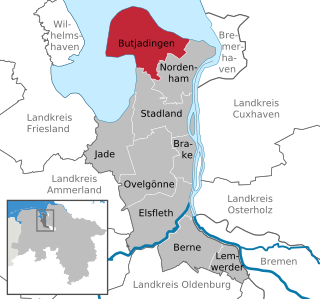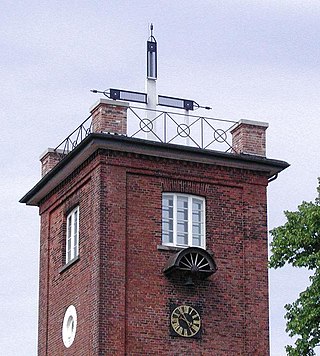
Lower Saxony is a German state (Land) in northwestern Germany. It is the second-largest state by land area, with 47,614 km2 (18,384 sq mi), and fourth-largest in population among the 16 Länder federated as the Federal Republic of Germany. In rural areas, Northern Low Saxon and Saterland Frisian are still spoken, albeit in declining numbers.

Frisia is a cross-border cultural region in Northwestern Europe. Stretching along the Wadden Sea, it encompasses the north of the Netherlands and parts of northwestern Germany. The region is traditionally inhabited by the Frisians, a West Germanic ethnic group.
Cuxhaven is a district (Landkreis) in Lower Saxony, Germany. It is bounded by the districts of Stade, Rotenburg, Osterholz and Wesermarsch, the city of Bremerhaven and the North Sea.
Osterholz is a district (Landkreis) in Lower Saxony, Germany. It is bounded by the districts of Wesermarsch, Cuxhaven, Rotenburg and Verden, and by the city of Bremen.
Verden is a Kreis (district) in the centre of Lower Saxony, Germany. Adjoining it are the districts of Osterholz, Rotenburg, Heidekreis, Nienburg, and Diepholz, as well as the city of Bremen.
The district of Oldenburg is a district in the state of Lower Saxony, Germany. It is bounded by the districts of Diepholz, Vechta, Cloppenburg and Ammerland, the city of Oldenburg, the district of Wesermarsch and the city of Delmenhorst.

The Duchy of Oldenburg —named after its capital, the town of Oldenburg—was a state in the north-west of present-day Germany. The counts of Oldenburg died out in 1667, after which it became a duchy until 1810, when it was annexed by the First French Empire. It was located near the mouth of the River Weser.

Delmenhorst is an urban district in Lower Saxony, Germany. It has a population of 74,500 and is located 10 kilometres west of downtown Bremen with which it forms a contiguous urban area, whereas the city of Oldenburg is 25 kilometres to the northwest. The city has a total area of 62.36 square kilometres ; and a population density of approx. 1200 inhabitants per km².

Nordenham is a town in the Wesermarsch district, in Lower Saxony, Germany. It is located at the mouth of the Weser river on the Butjadingen peninsula on the coast of the North Sea. The seaport city of Bremerhaven is located on the other side of the river. The Midgard-seaport in Nordenham is the largest private-owned harbor in Germany.

Butjadingen is a peninsula and municipality in the Wesermarsch district, in Lower Saxony, Germany.
Bouches-du-Weser was a department of the First French Empire in present-day Germany. It was formed in 1811, when the region was annexed by France. Prior to the Napoleonic occupation, its territory had been divided between the Free Hanseatic City of Bremen, the duchy of Oldenburg, and the Hanoverian duchies of Bremen and Verden, the latter of which had intermittently been incorporated into the Kingdom of Westphalia in 1807. Its territory is part of the current German states of Lower Saxony and Bremen. Its capital was Bremen.

The Jade Bight is a bight or bay on the North Sea coast of Germany. It was formerly known simply as Jade or Jahde. Because of the very low input of freshwater, it is classified as a bay rather than an estuary.

Brake is the district seat of Wesermarsch district in northern Germany.

Stadland is a municipality in the district of Wesermarsch, in Lower Saxony, Germany. It is situated on the left bank of the Weser, approx. 32 km northeast of Oldenburg, and 42 km northwest of Bremen. On the west side Stadland bordered to the Jade Bight. Its seat is in the village Rodenkirchen, which is also part of this municipality as the villages Schwei, Seefeld and Kleinensiel. There are also many little Bauernschaften (hamlets) in Stadland.

Bremen, officially the City Municipality of Bremen, is the capital of the German state Free Hanseatic City of Bremen, a two-city-state consisting of the cities of Bremen and Bremerhaven. With about 570,000 inhabitants, the Hanseatic city is the 11th largest city of Germany and the second largest city in Northern Germany after Hamburg.

The Weser Depression or Weser Lowlands is the region north of Porta Westfalica in Germany, where the River Weser no longer flows through a valley, but a broad plain consisting of meadows and river terraces.

The Bremen–Oldenburg railway is a 44.4 km (27.6 mi) long mainline railway that connects Oldenburg in the northwest of the German states of Lower Saxony and Bremen.

John V, Count of Oldenburg and Delmenhorst was a member of the House of Oldenburg. He was the ruling Count of Oldenburg from 1500 to 1526. His parents were Gerhard VI, Count of Oldenburg and Adelheid of Tecklenburg.

Delmenhorst – Wesermarsch – Oldenburg-Land is an electoral constituency represented in the Bundestag. It elects one member via first-past-the-post voting. Under the current constituency numbering system, it is designated as constituency 28. It is located in northwestern Lower Saxony, comprising the city of Delmenhorst and the districts of Wesermarsch and Landkreis Oldenburg.

Christina-Johanne Schröder is a Green German politician and Member of the Bundestag.


















